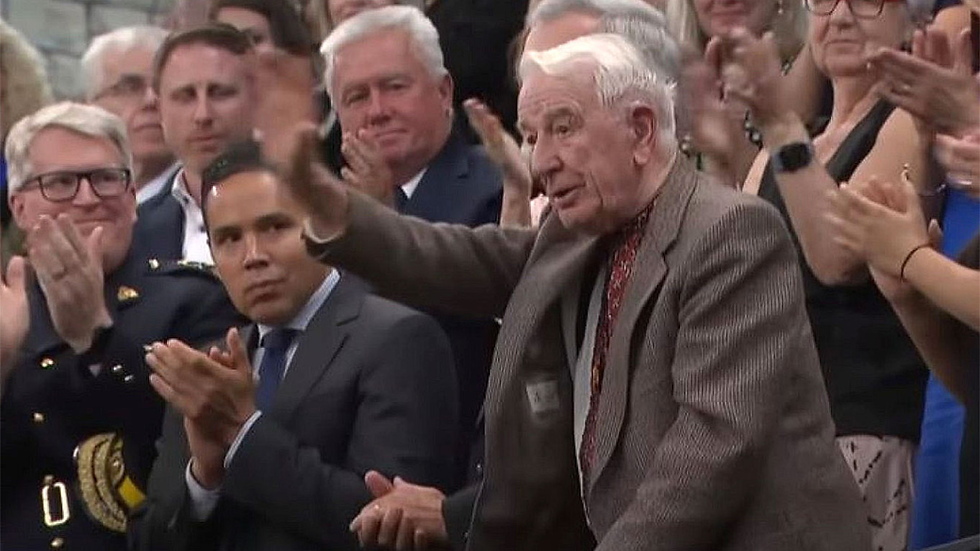The Canadian political landscape has recently been rocked by an incident that has sparked widespread controversy and ignited a national debate. Yaroslav Hunka, a Canadian-Ukrainian who was part of the elite Nazi Waffen SS during World War II, was applauded in the Canadian Parliament, leading to an uproar both within and outside political circles. This occurrence has not only stirred a wave of outrage across Canada, but it has also raised serious questions about the nation's understanding of historical events, its stance on those who collaborated with the Nazis, and its commitment to democratic values.
Yaroslav Hunka is a Ukrainian veteran who was a member of the Nazi SS faction during World War II. His past came under intense scrutiny after being recognized and applauded in the Canadian Parliament. The incident has ignited a nationwide debate on historical memory and Canada's attitude towards those who were involved with Nazi atrocities.
Hunka’s service in the Nazi Waffen SS has been a subject of controversy for years. His involvement with the Nazis during World War II is well-documented, and his actions during the war have been condemned by many. Despite this, he managed to escape international attention until his recognition in the Canadian Parliament brought his past back into the limelight.

Yaroslav Hunka being applauded in Canadian parliament
The applause given to Hunka in the Parliament has been severely criticized, with many arguing that it demonstrates a troubling lack of awareness about the horrors of Nazism and the atrocities perpetrated by Hitler's regime. Critics argue that applauding a man who served in a Nazi unit shows a blatant disregard for the millions of lives lost as a result of Nazi rule.
The incident has significantly damaged the reputation of the Canadian Parliament, which is typically regarded as a symbol of democratic values. It has raised questions about the judgment and integrity of those who participated in the applause, and has sparked a heated debate about the responsibility of politicians in promoting historical accuracy and awareness.
The controversy has also led to widespread condemnation from the international community. Several countries, particularly those directly affected by Nazi atrocities during World War II, have expressed their disapproval and shock at the incident. This international backlash has further tarnished Canada's image and strained its relations with several nations.
The incident has led to significant political fallout. Prime Minister Justin Trudeau issued a public apology on behalf of the Parliament, expressing regret for the honour given to Hunka. Trudeau's apology, though seen as a necessary step, has been criticized by some as too little, too late. Many perceive his apology as an attempt to mitigate the political damage from the incident and distance his administration from the controversial applause, with the apology lacking much substance.
In a major development, Anthony Rota, Speaker of Canada's House of Commons, resigned following the incident. His resignation is seen as a direct result of the backlash and marks a critical moment in Canadian politics. As the Speaker, Rota was responsible for maintaining order in the House of Commons he too took the blame for the incident. Consequently, his resignation has left a leadership vacuum that will be challenging to fill.

Anthony Rota, declaring his resignation as Speaker of Canada's house of commons
The incident has also sparked a broader discussion about the need for greater accountability in politics. Many are calling for stricter measures to prevent such incidents in the future, including better vetting of individuals recognized in the parliament and more comprehensive education of historical events for public officials.
The incident comes at a crucial juncture, with Canada's elections around the corner. The controversy has added a new facet to the electoral discourse, compelling politicians to address issues related to historical memory, the nation's stance towards Nazi collaborators, and the importance of maintaining the integrity of public institutions.
The controversy could also affect the electoral prospects of several candidates. Trudeau's public apology, while important, may not be enough to quell the public outrage. His handling of the incident will undoubtedly be a key issue in the upcoming elections, and his political opponents are likely to use it to question his leadership and judgment.
On the other hand, this incident could also provide an opportunity for politicians to demonstrate their commitment to democratic values and historical accuracy. Candidates who take a strong stance against the recognition of Nazi collaborators and advocate for better education on historical events could gain public support.
In conclusion, the recognition of a Ukrainian man who served in a Nazi unit by the Canadian Parliament has ignited outrage and led to significant political consequences. As Canada prepares for its elections, this incident serves as a stark reminder of the importance of historical memory in shaping contemporary politics. The controversy surrounding Yaroslav Hunka underscores the need for greater accountability in politics, more comprehensive education on historical events, and a renewed commitment to democratic values.
